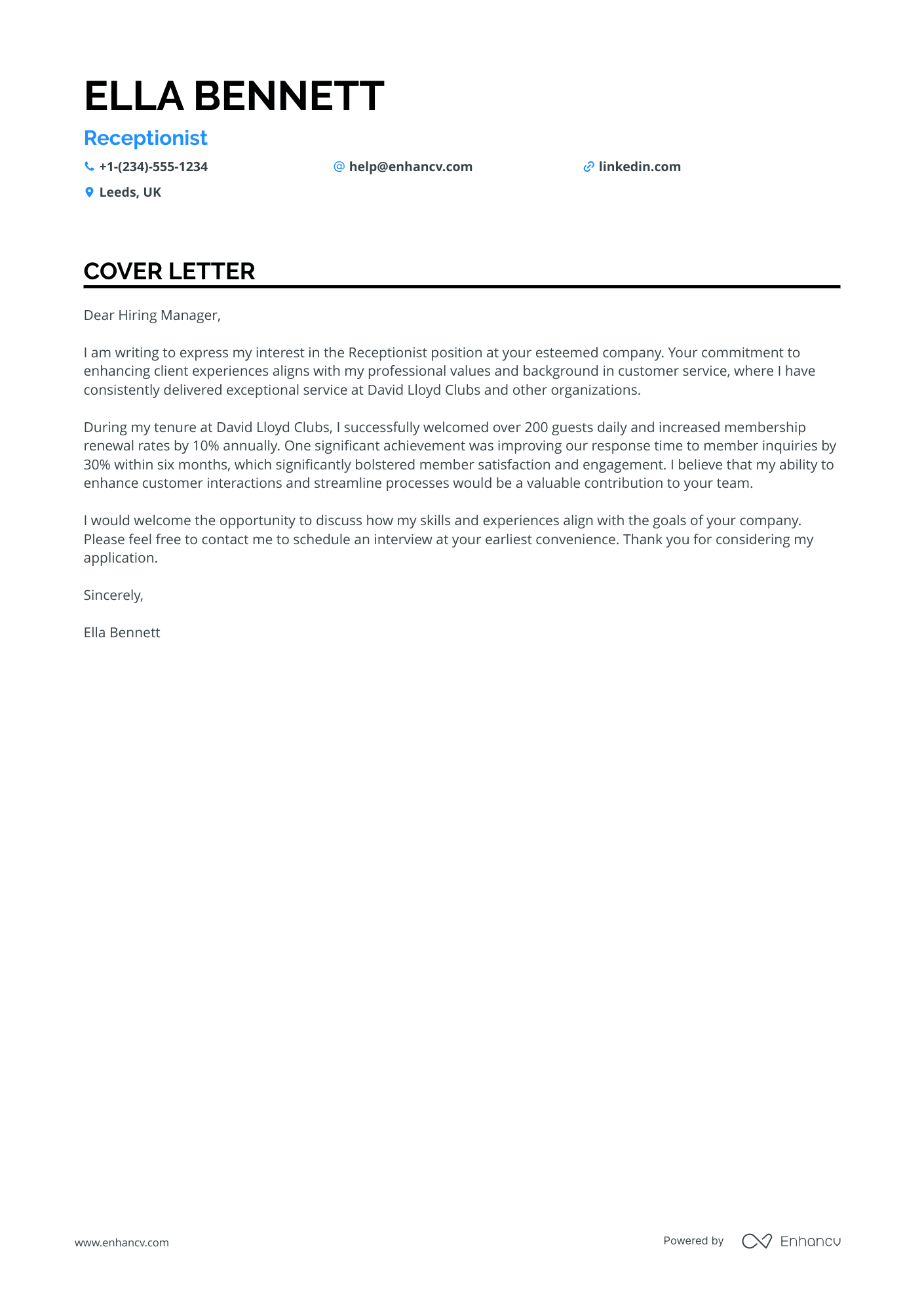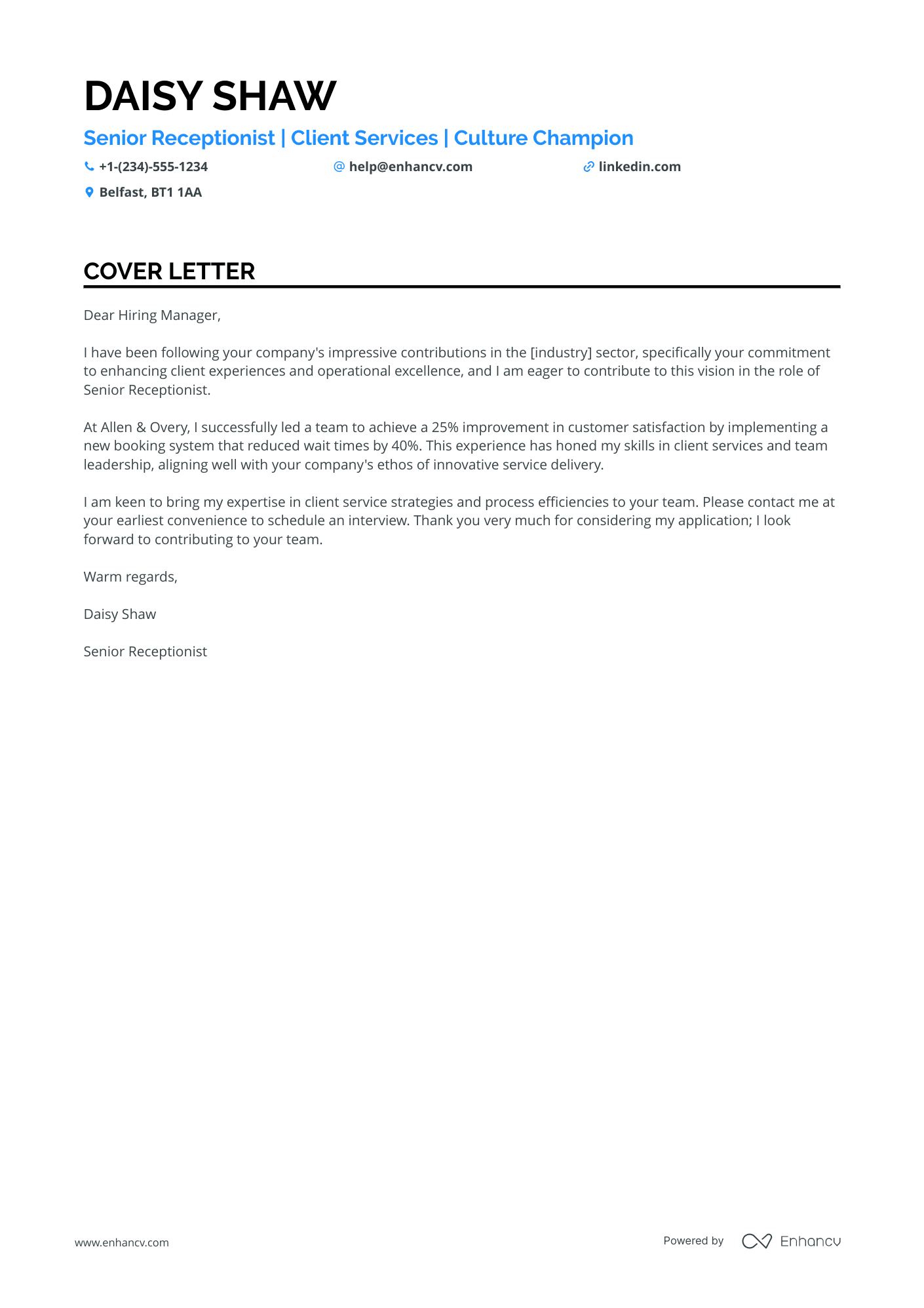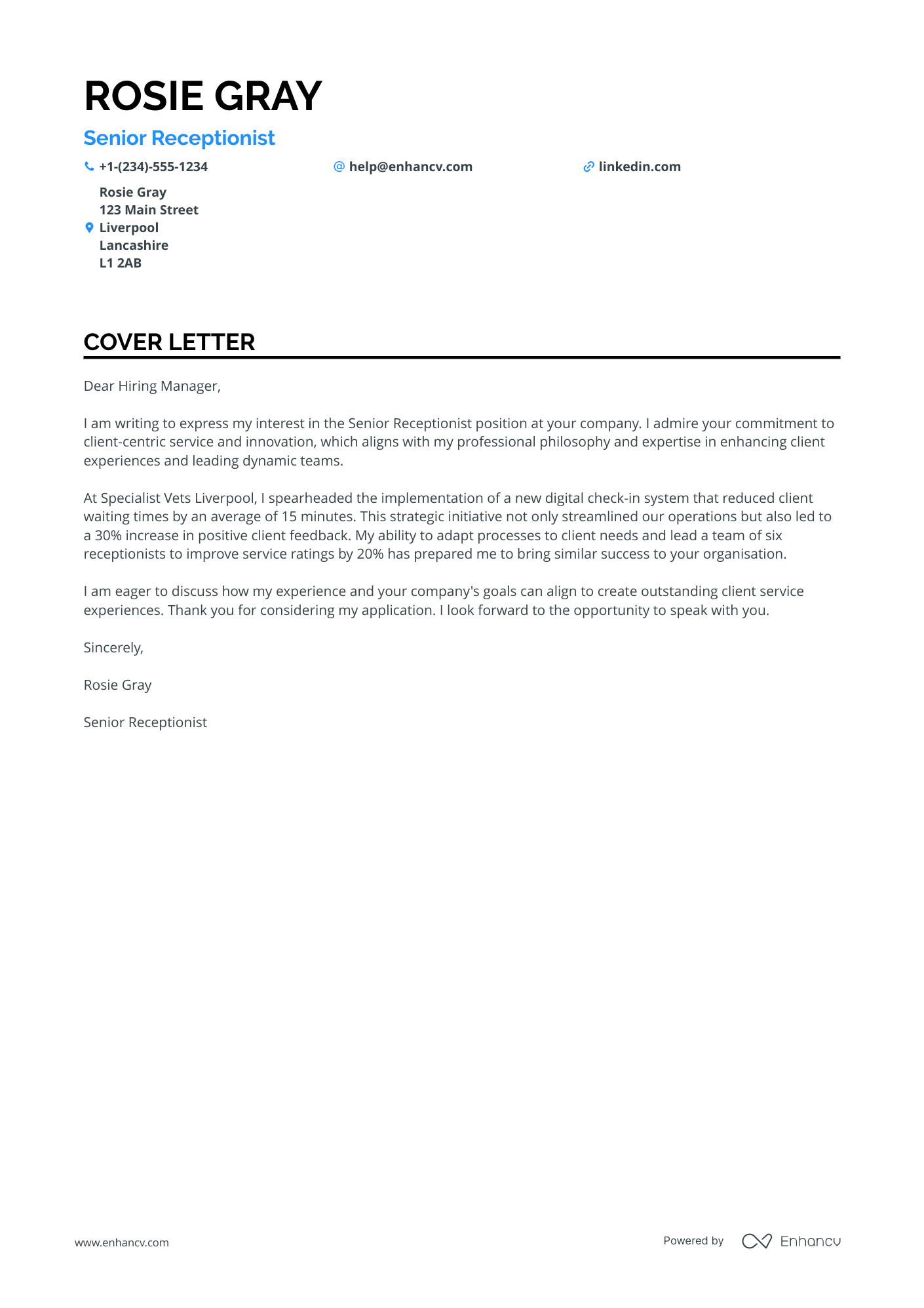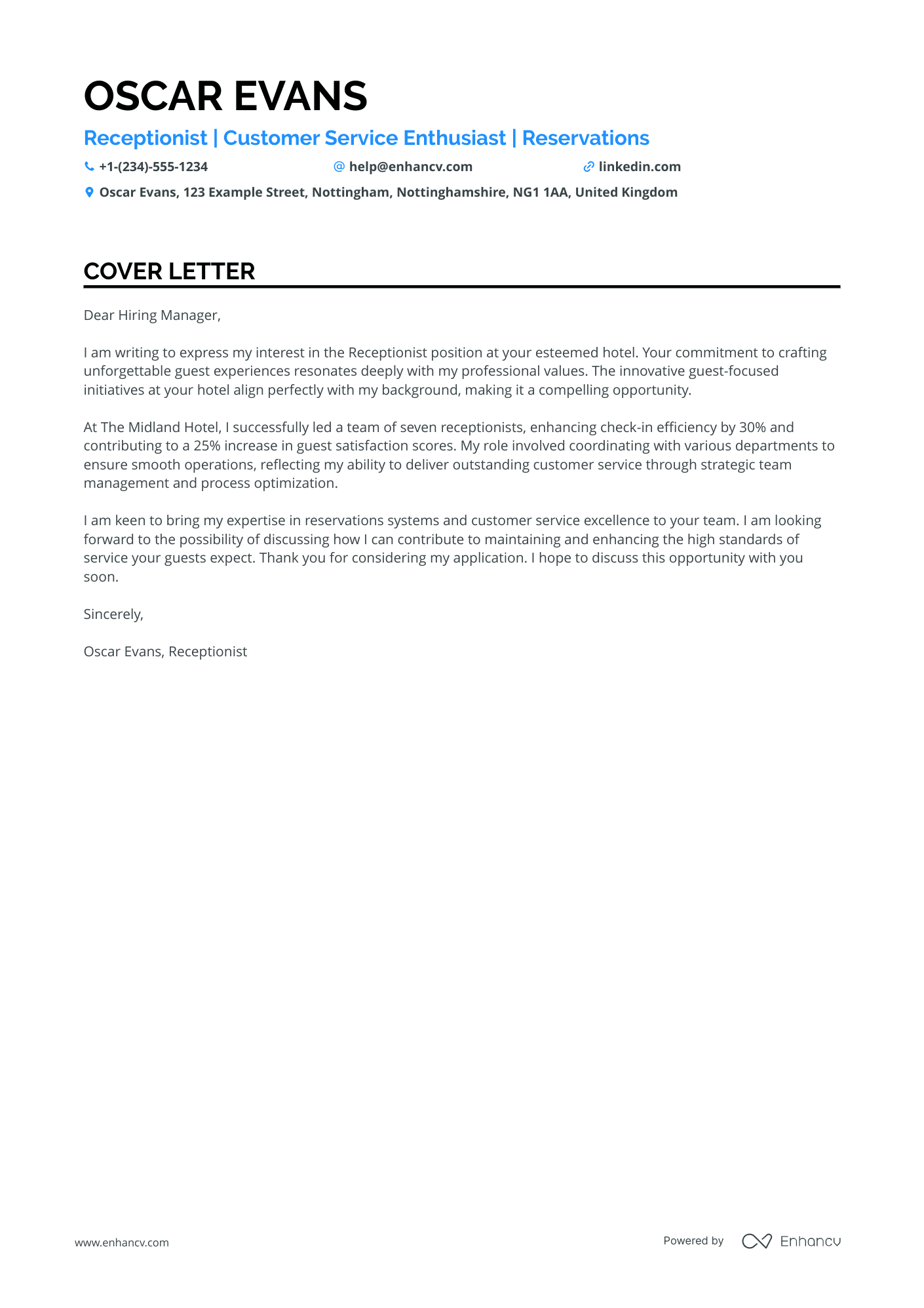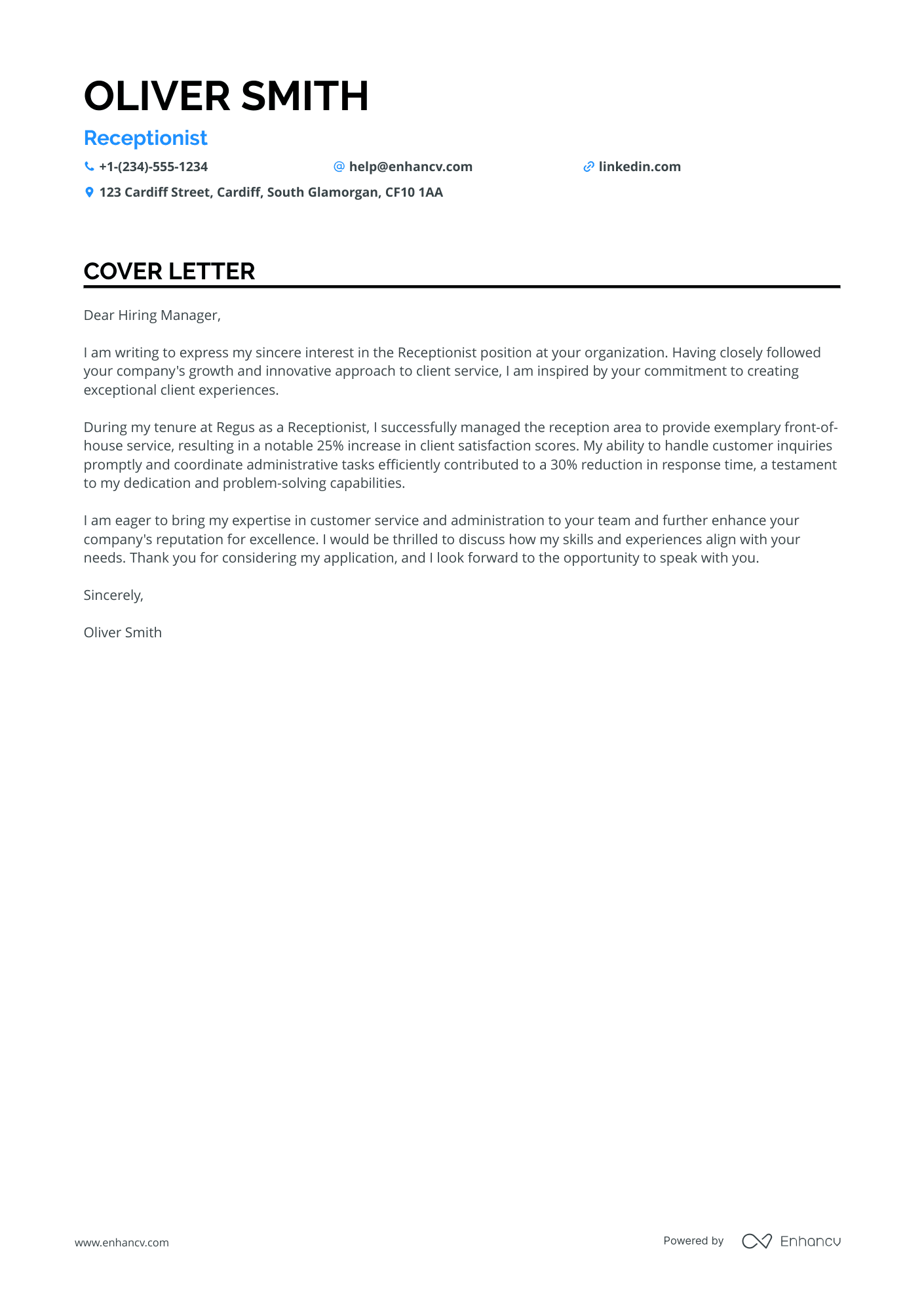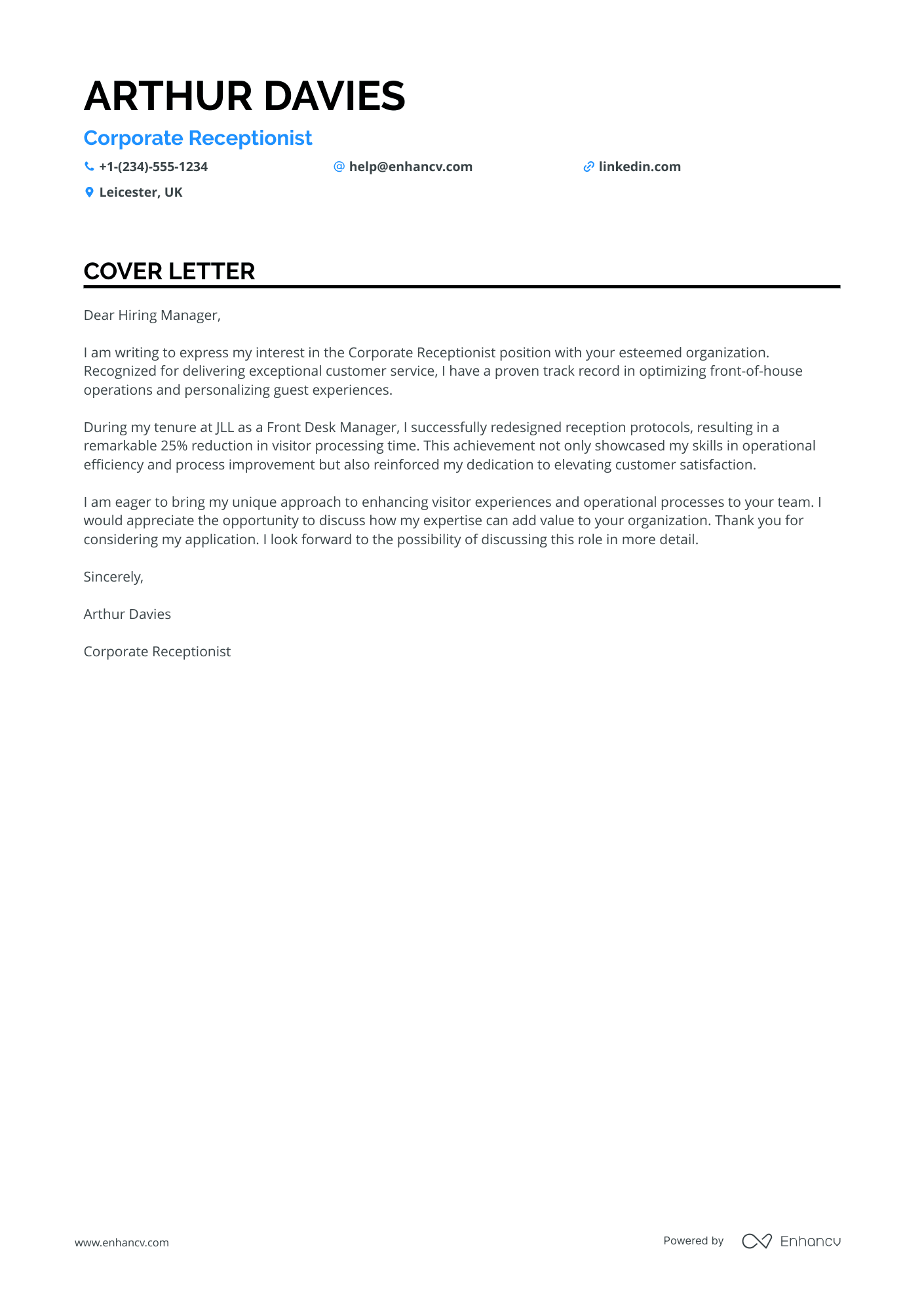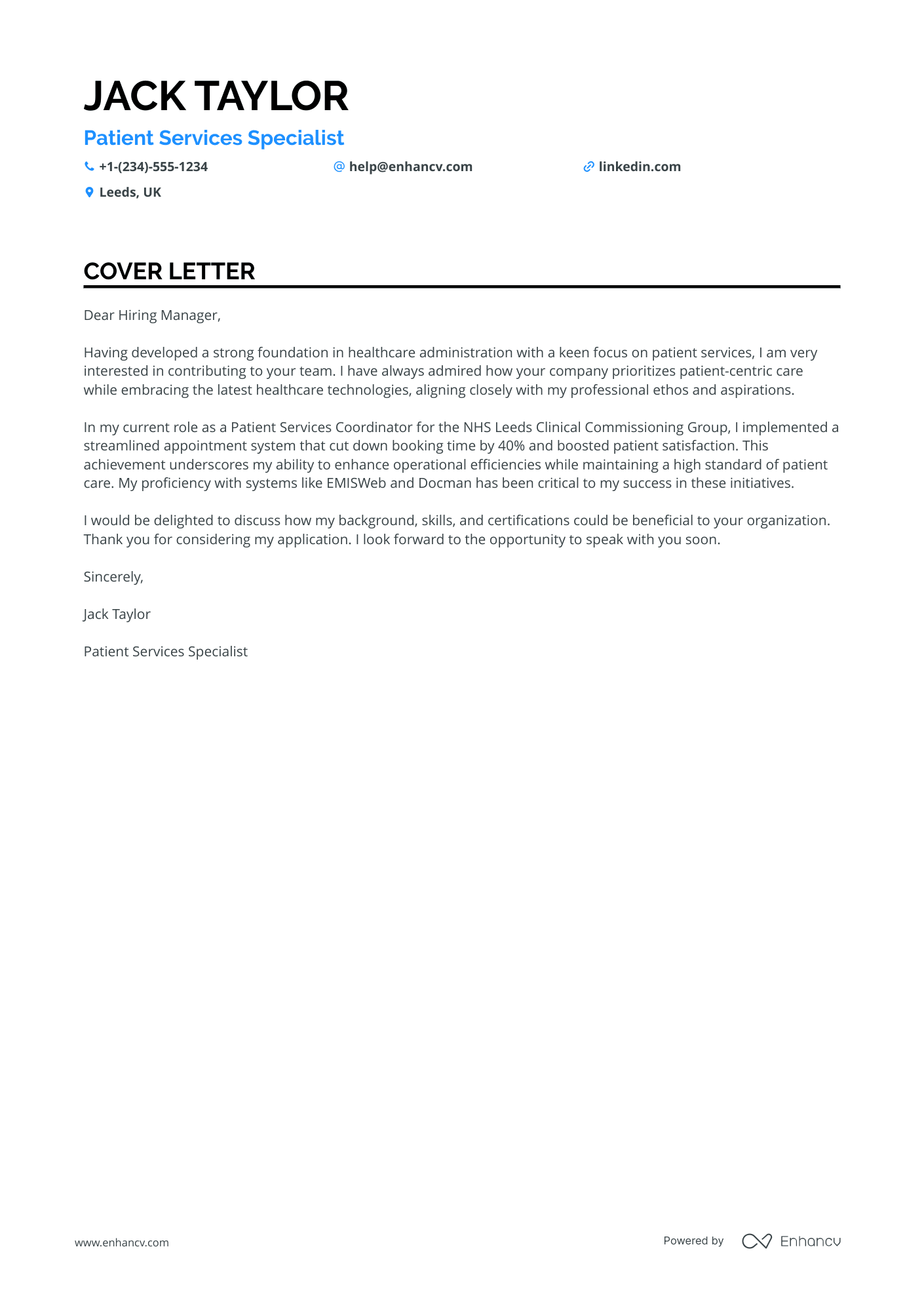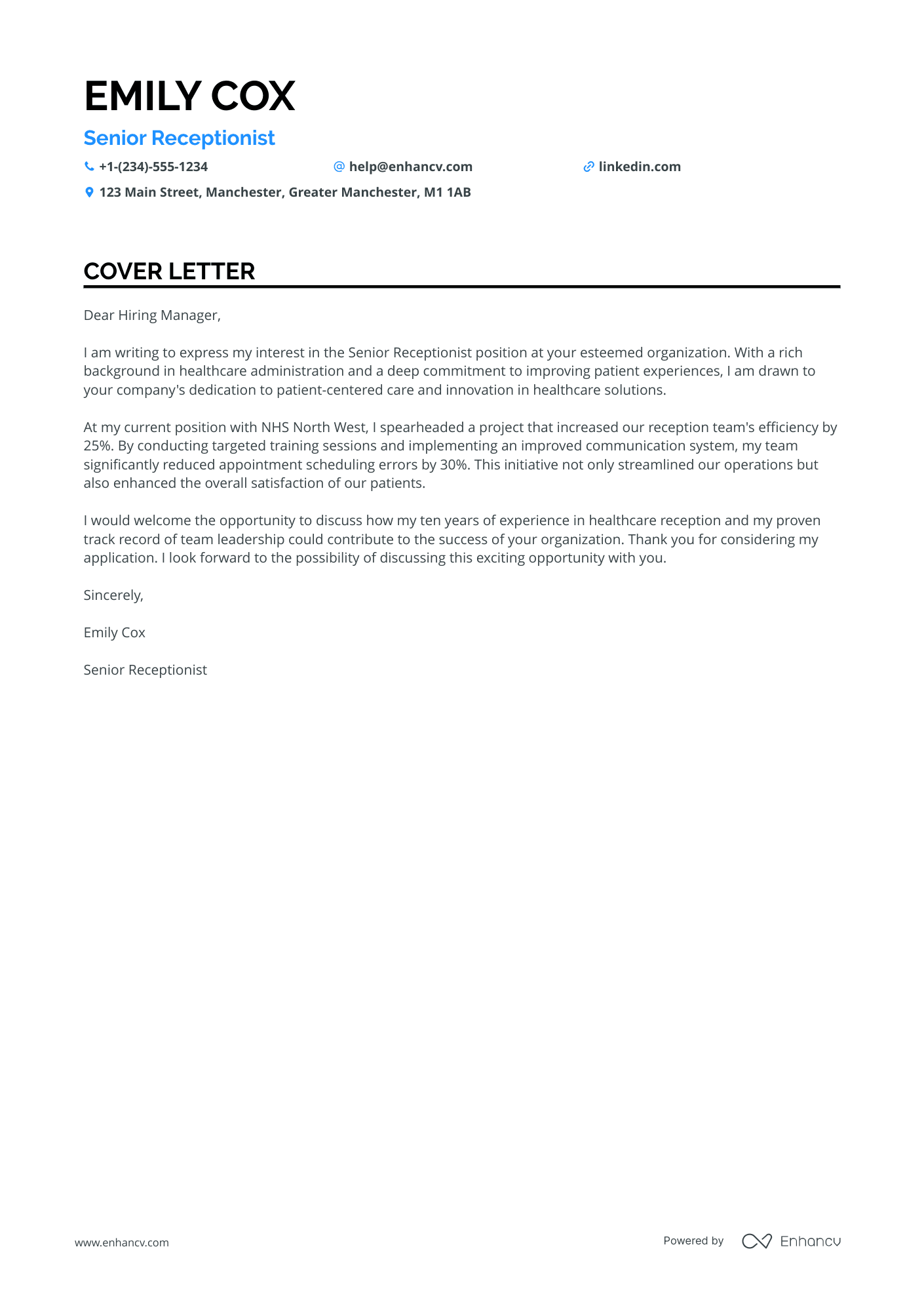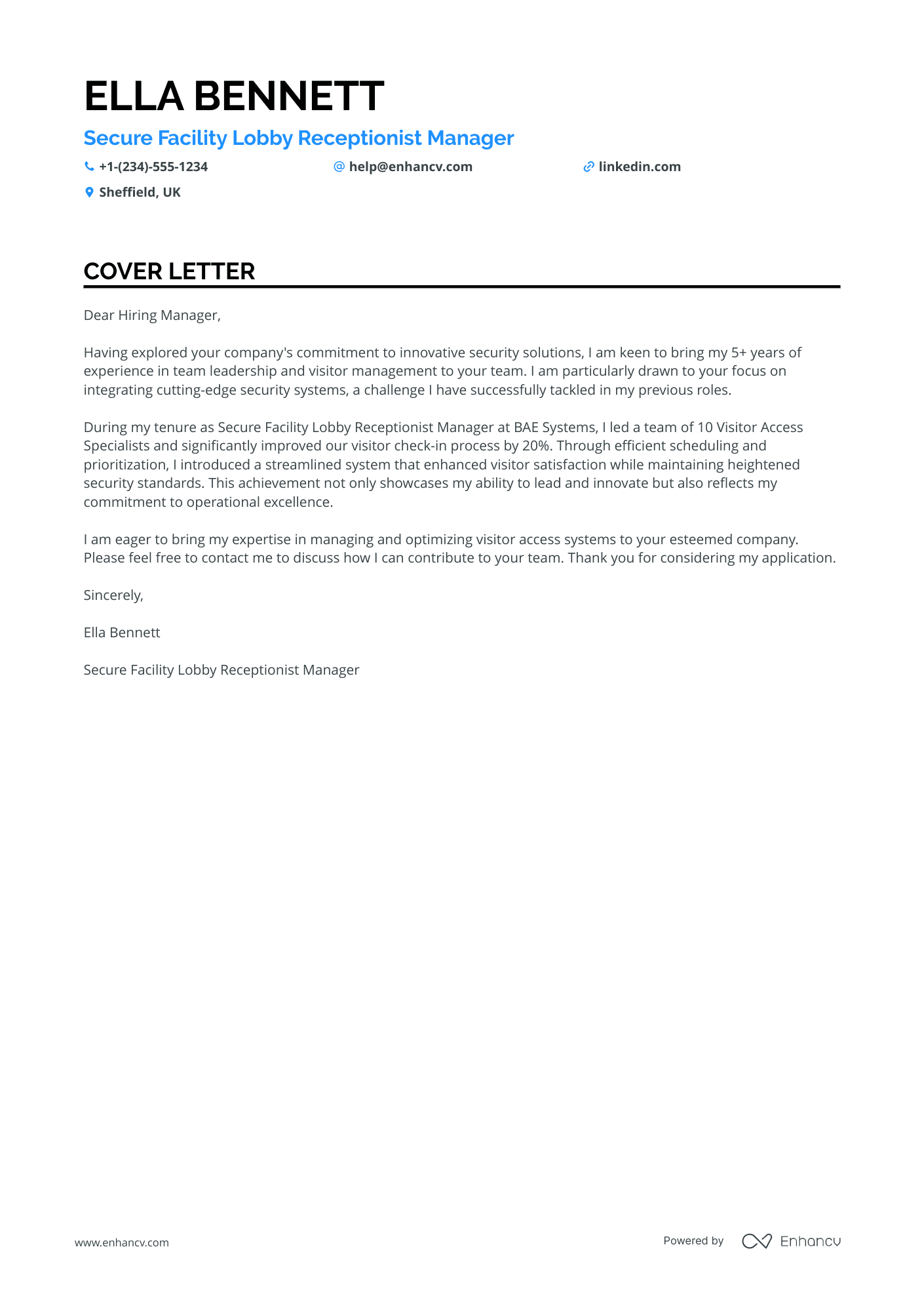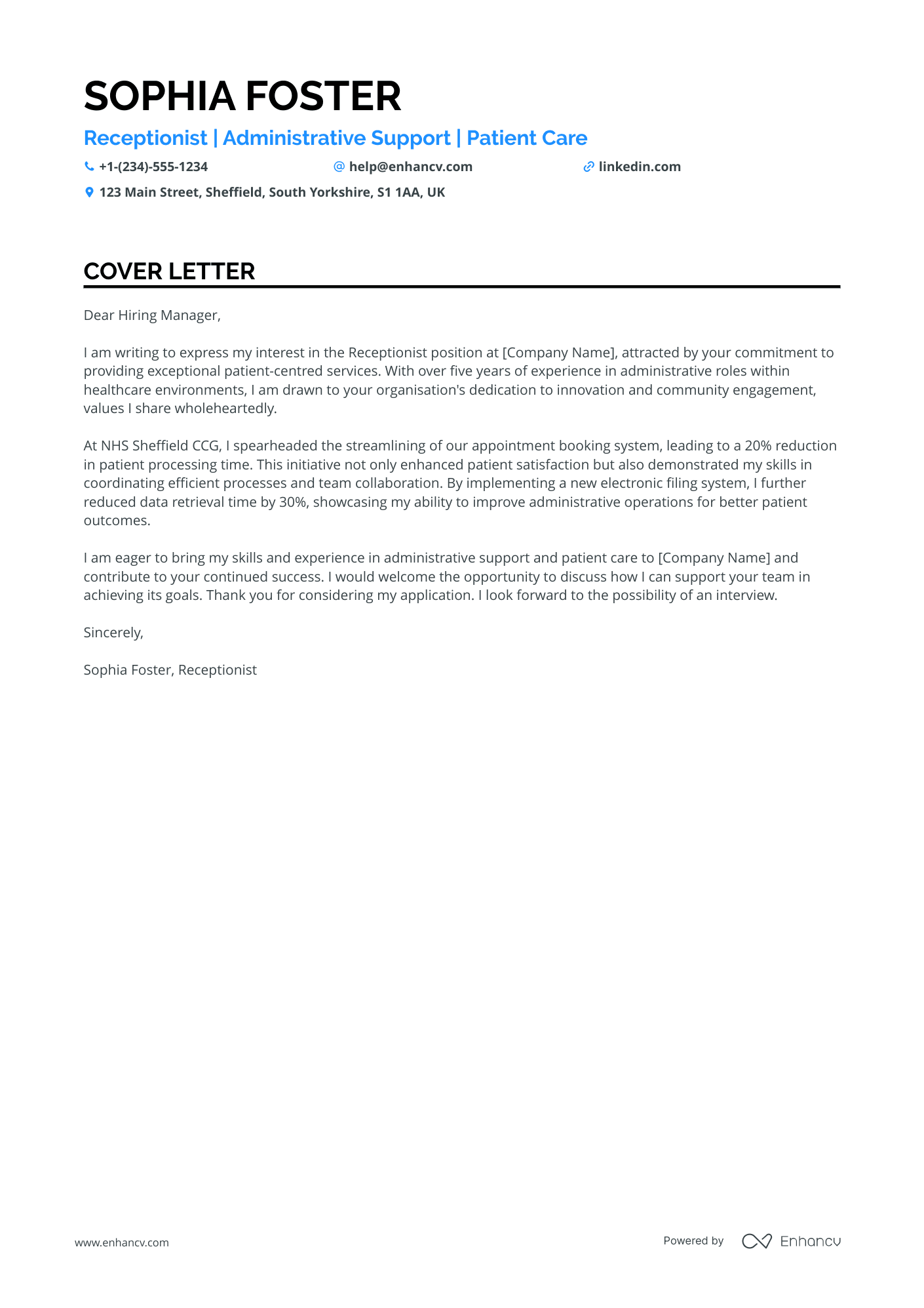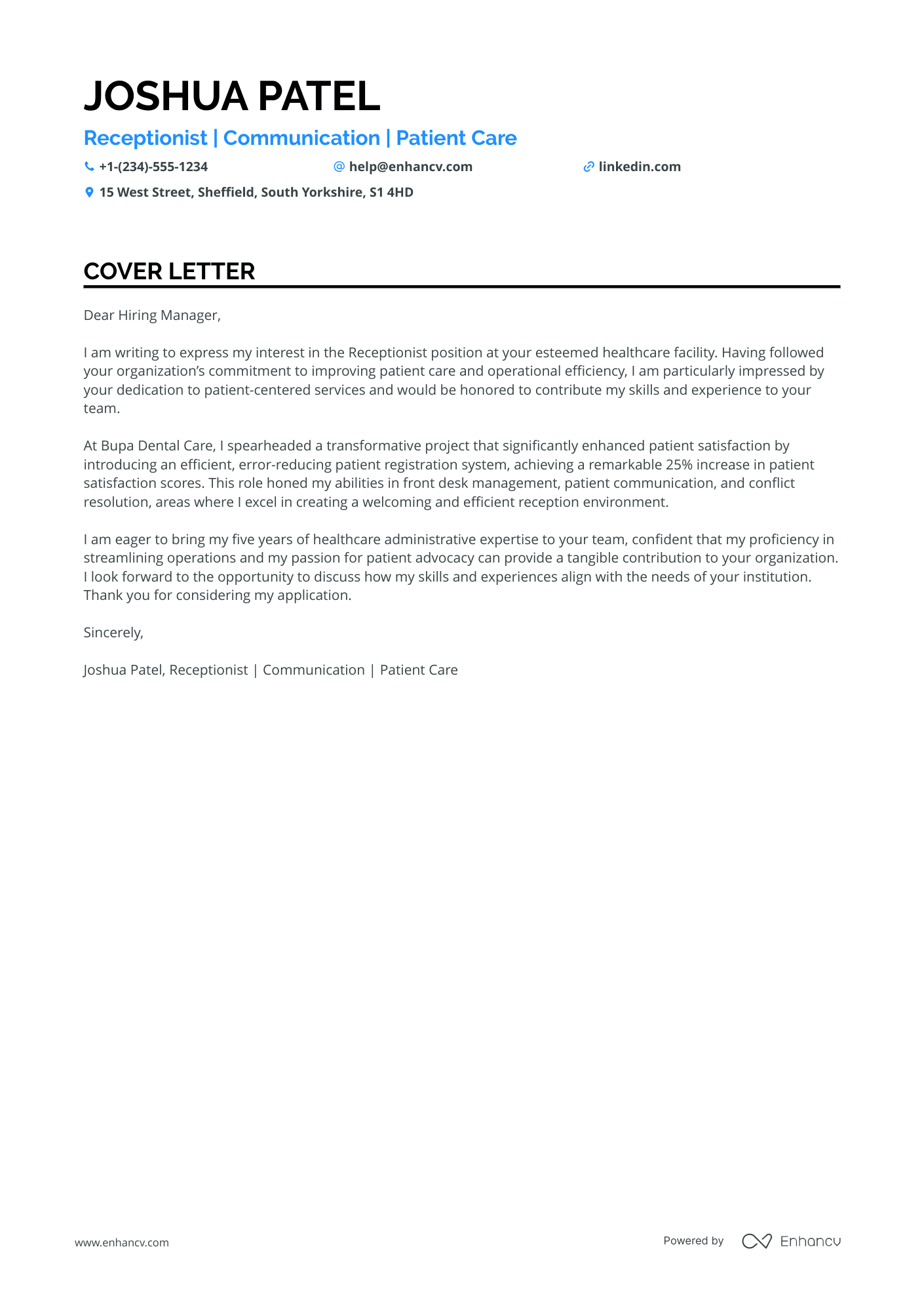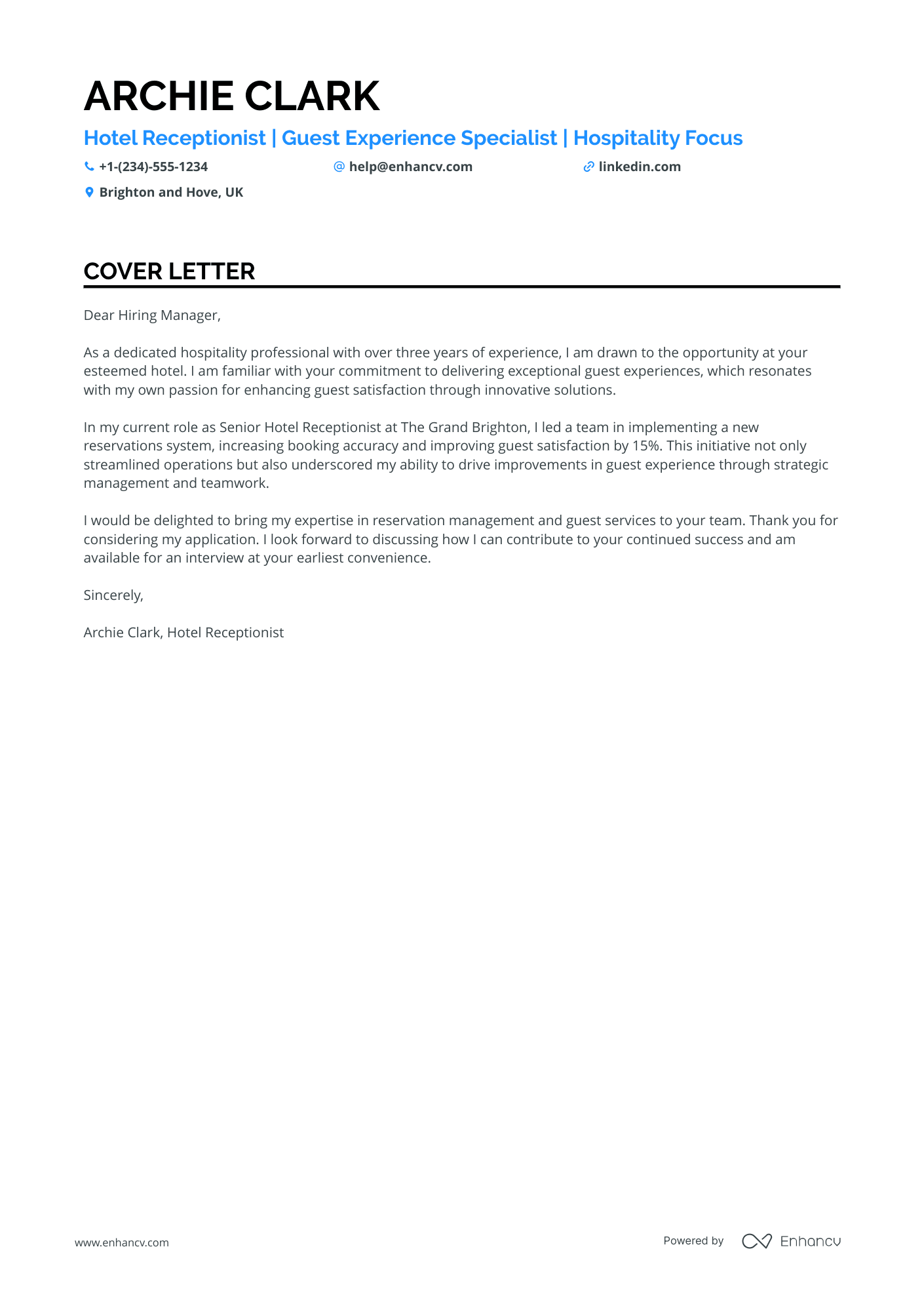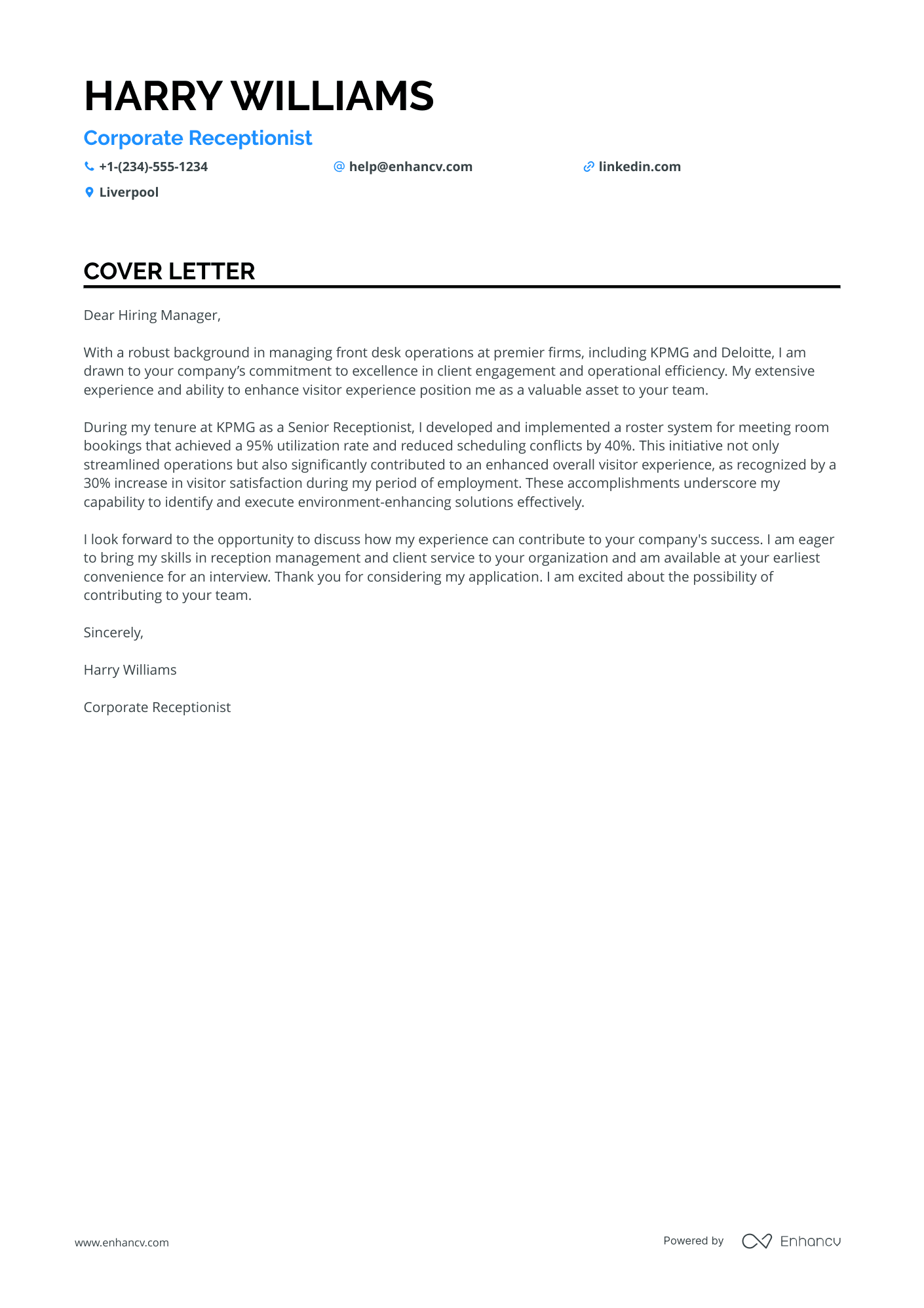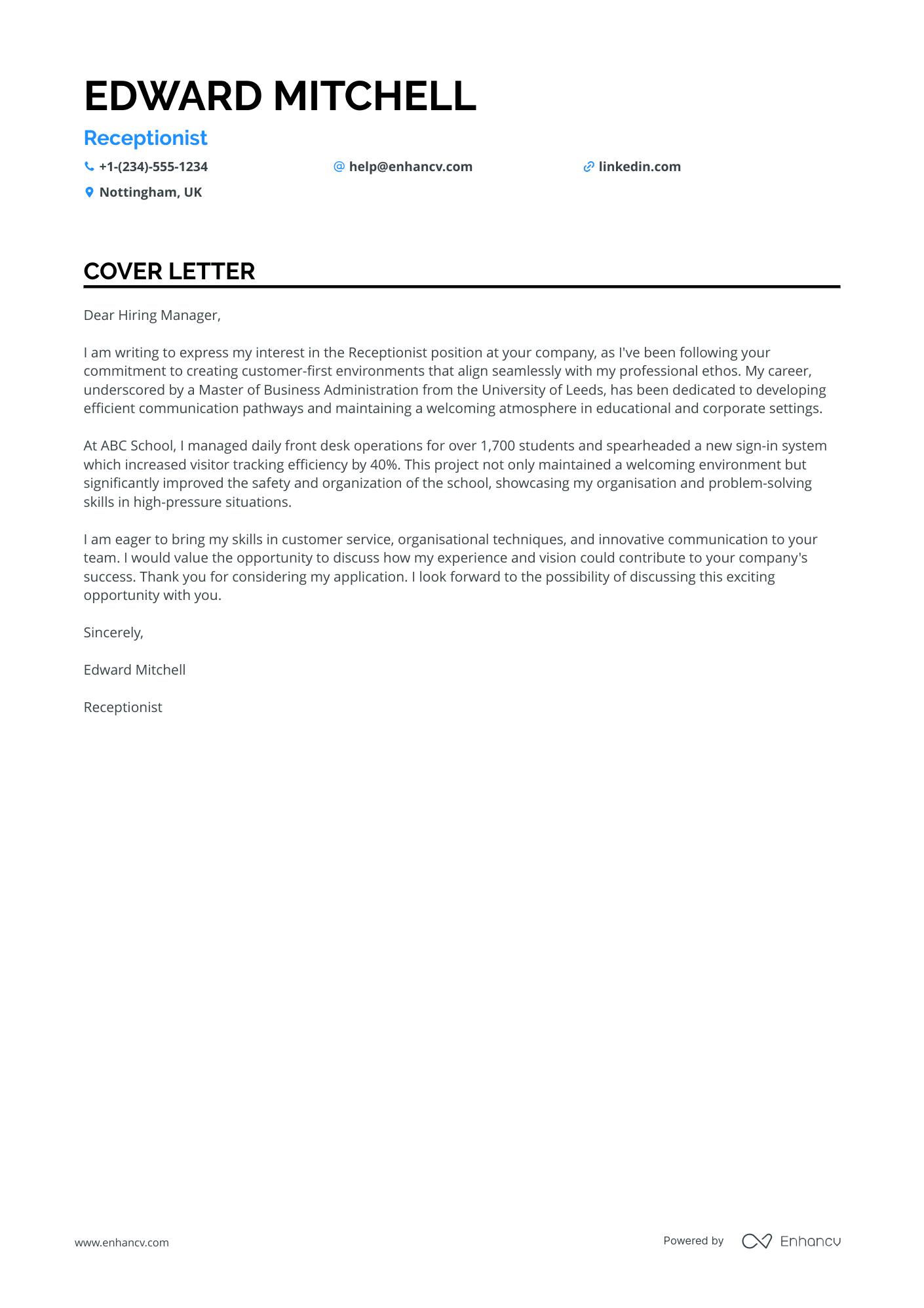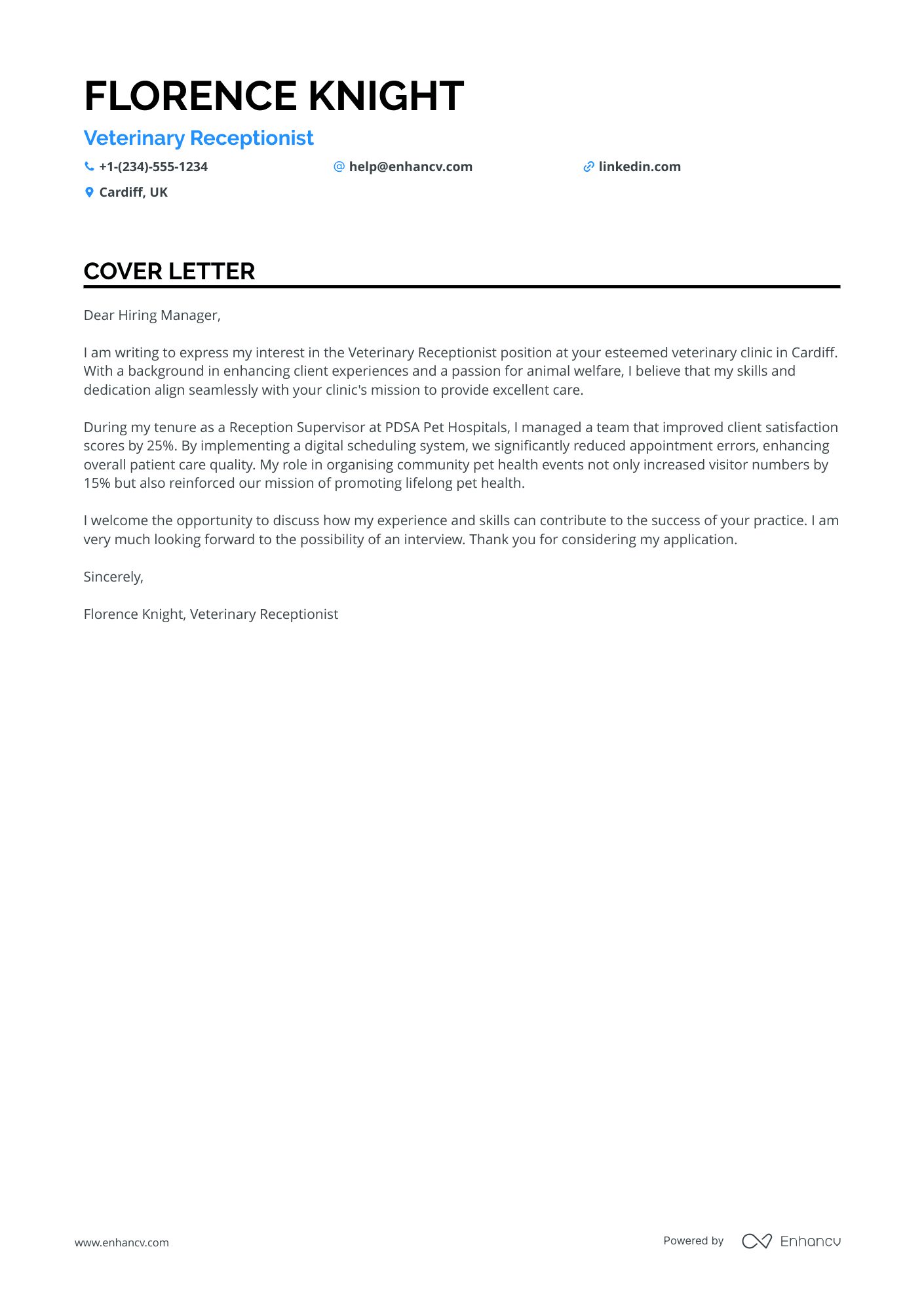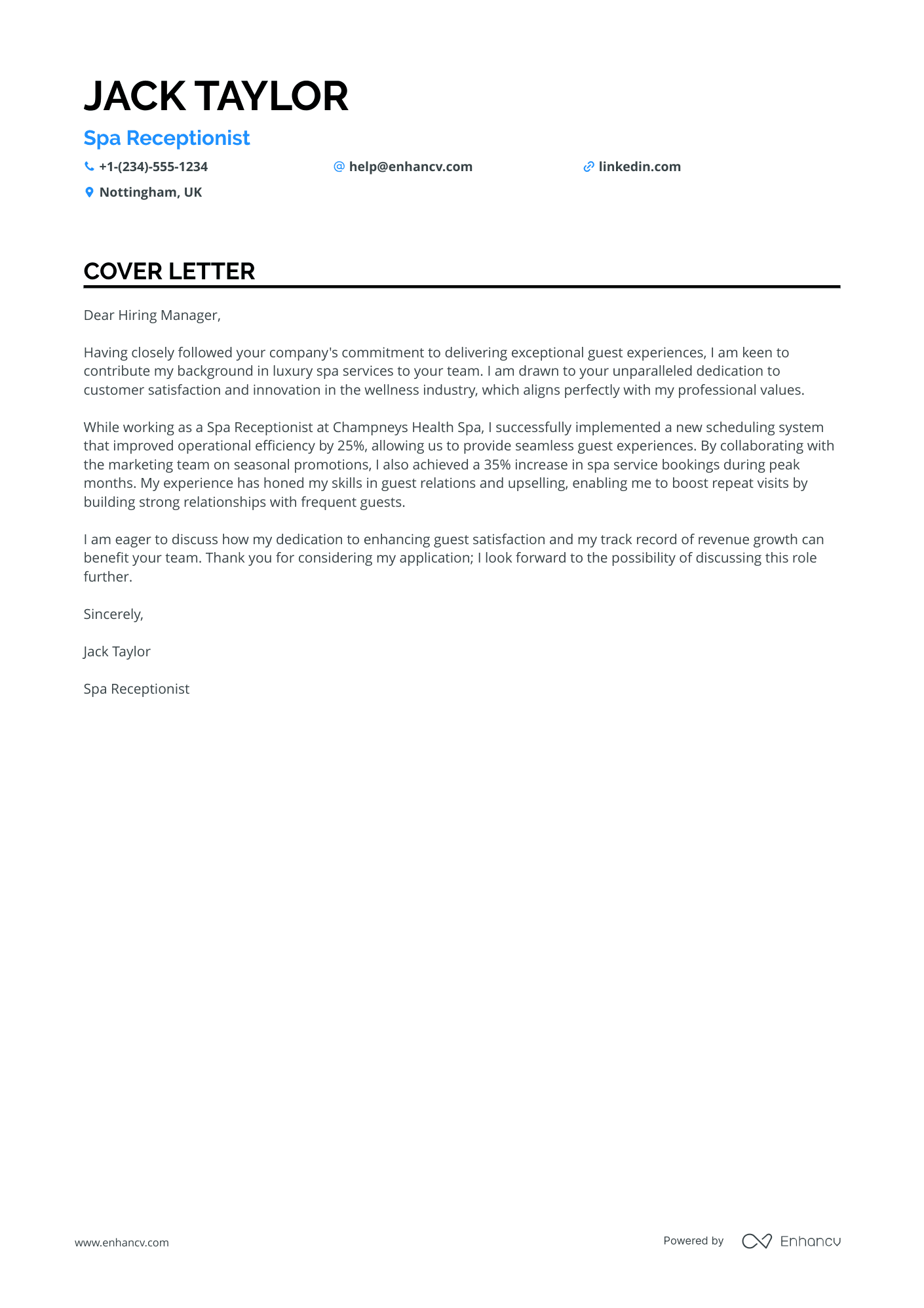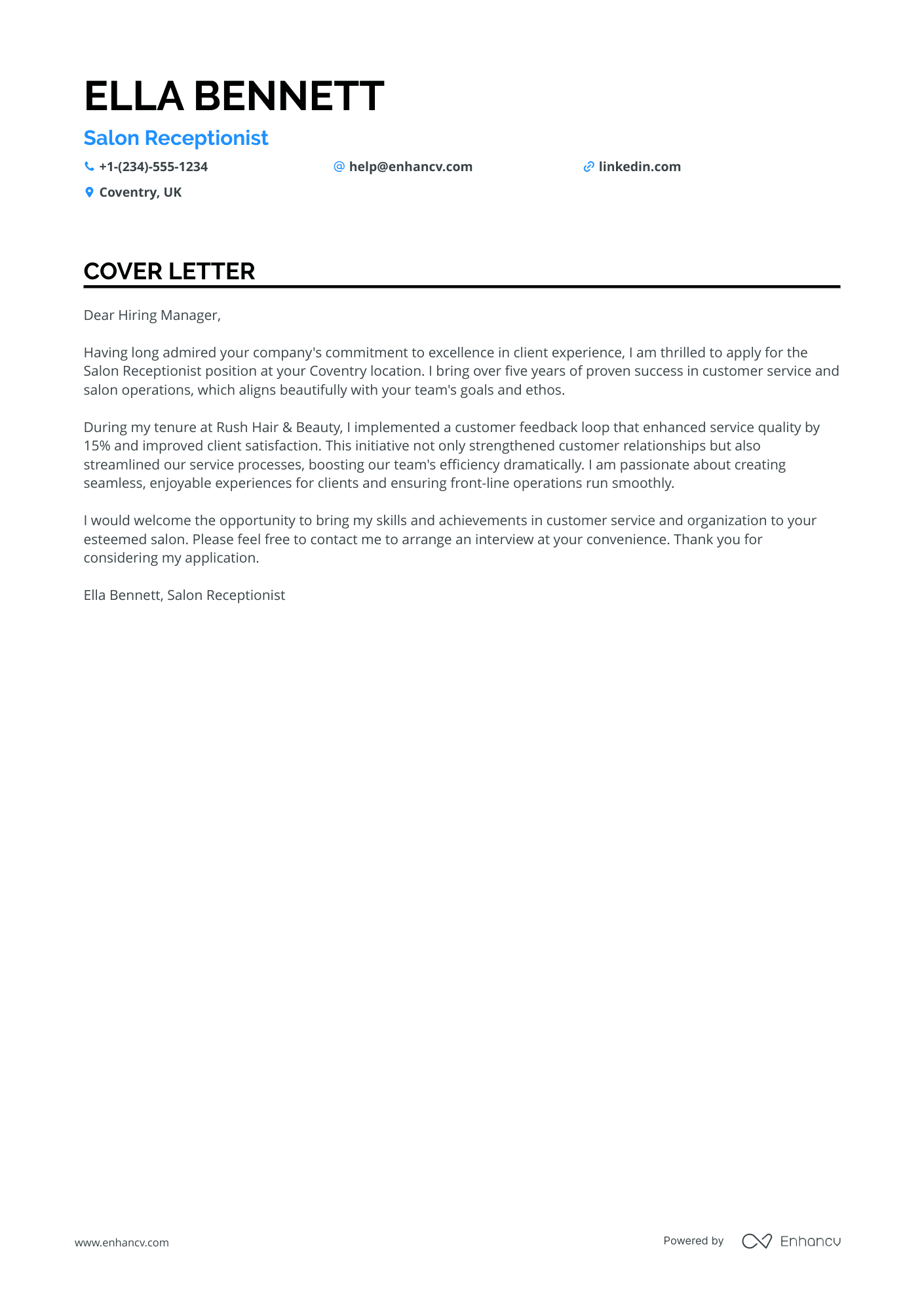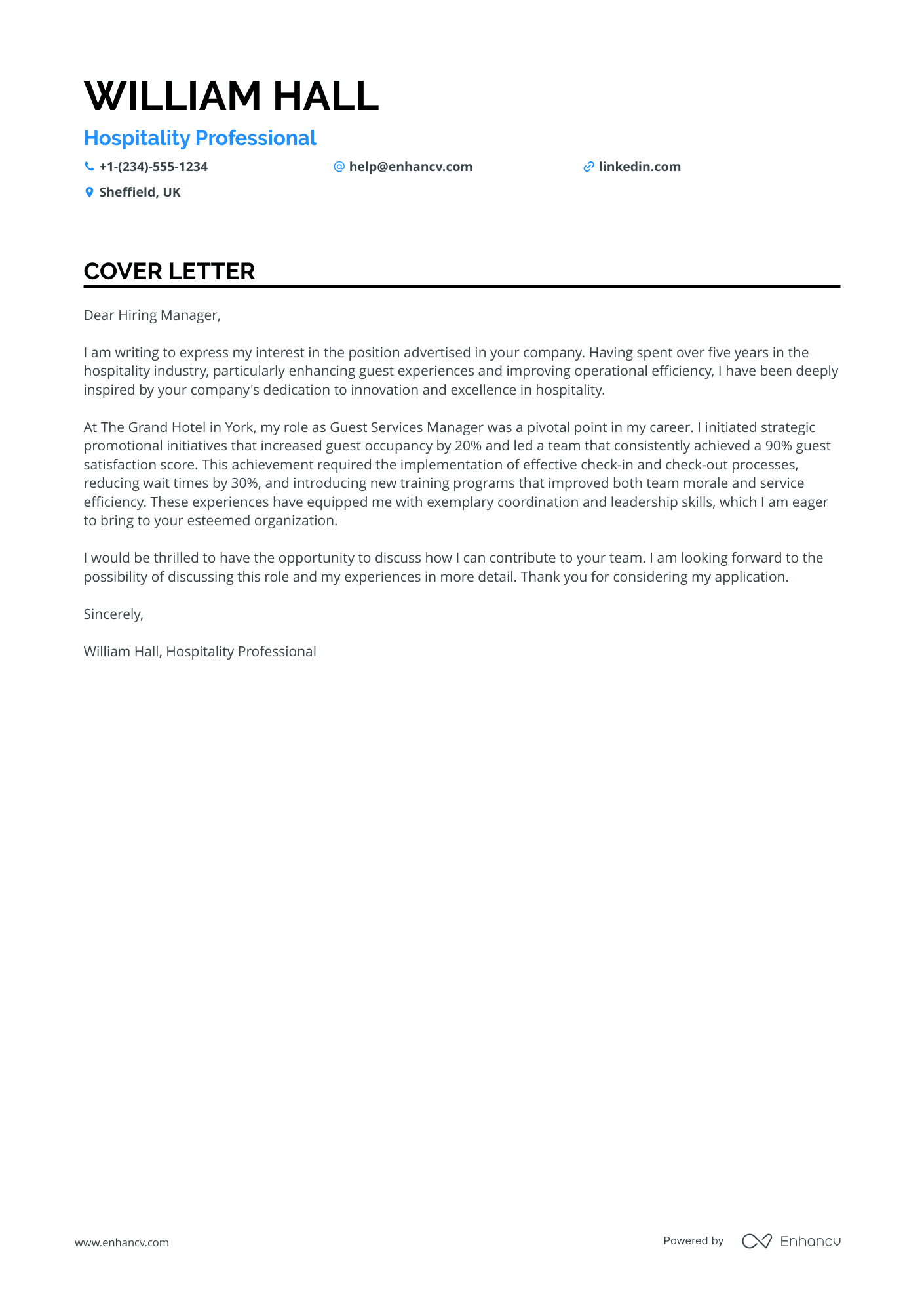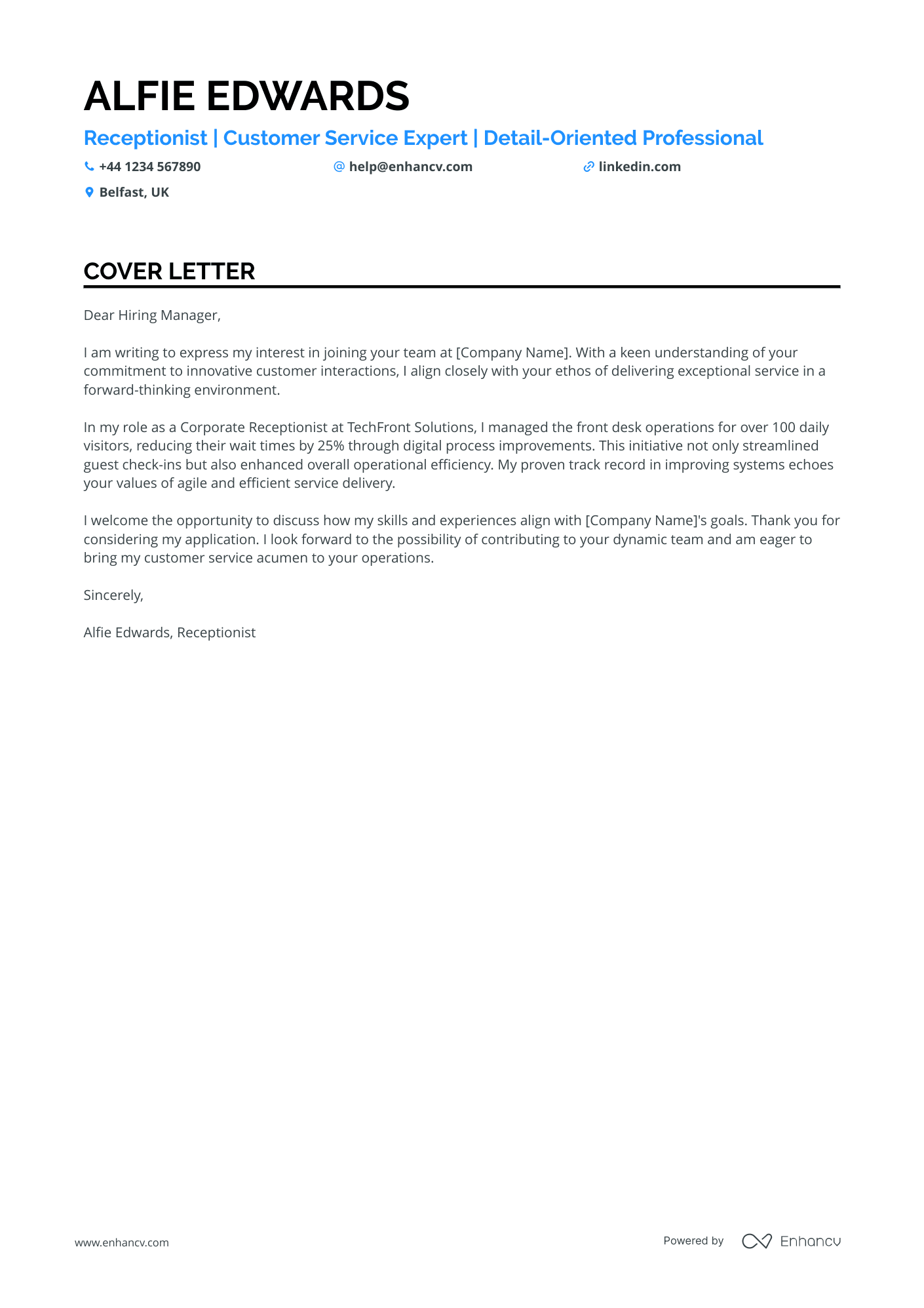Writing a strong cover letter requires close attention to detail, from the tone of voice to avoiding those pesky spelling or grammar mistakes.
Overlooking similar small details can weaken your application.
Many candidates also struggle with how to address the letter, often opting for 'Dear Sir or Madam' when they can’t find the correct contact. This can make your cover letter feel impersonal.
In this guide, we’ll show you how to perfect these crucial elements, ensuring your cover letter is polished and professional without relying on clichés.
Cover letter examples for receptionist
By Experience
Junior Receptionist
- Highlight the candidate’s role in improving response times and increasing membership renewal rates, as this directly demonstrates their ability to enhance client experience and satisfaction, which is crucial for a receptionist position.
- Emphasise the "Customer Service Excellence" course completed with the Chartered Institute of Marketing, showing commitment to continuous professional development in key areas relevant to the role.
- Mention the experience in training and mentoring junior team members, which reflects leadership potential and the ability to support and improve overall team performance.
- Include the proficiency in using scheduling software and maintaining accurate records, which are valuable skills for managing reception desk operations efficiently.
Senior Receptionist
- Relevant Experience: Demonstrating over 5 years of experience in client services and reception management, which is crucial for a Senior Receptionist role.
- Quantifiable Achievements: Including specific improvements such as a 30% boost in client satisfaction and a 40% reduction in wait times emphasises the impact made in previous roles.
- Leadership and Team Management Skills: Highlighting experience in managing teams and conducting training sessions, which is critical for a senior position that involves supervising others.
- Education and Relevant Certifications: Mentioning advanced degrees in Management and Hospitality, along with courses in Client Services and Team Leadership, strengthens the candidate's qualifications for the role.
Lead Receptionist
- Emphasise Leadership Experience: Rosie clearly showcases her leadership skills by highlighting roles where she managed teams and led initiatives, which is crucial for a Senior Receptionist position.
- Highlight Efficiency Improvements: Specific achievements such as implementing a digital check-in system and developing training programs demonstrate her ability to improve operations and client satisfaction.
- Link Education to Skills: Aligning her academic background with her professional roles, Rosie effectively ties her MBA to advanced client service strategies, underscoring her suitability for a senior role.
- Showcase Client Service Success Stories: Providing quantifiable metrics on client satisfaction and complaint reduction solidifies her effectiveness in delivering exceptional client service.
Part-Time Receptionist
- Emphasising the Guest Satisfaction Score Increase: Highlighting a 25% improvement in guest satisfaction scores showcases effective service enhancements and a strong commitment to customer service, aligning well with roles in hospitality.
- Mentioning Training Program Development: Creating a training protocol that enhances team efficiency and reduces onboarding time demonstrates leadership and process optimisation skills, valuable for management positions in hospitality.
- Highlighting Advanced Customer Service Certification: Including courses such as Advanced Customer Service Excellence from Coursera emphasises an ongoing commitment to professional development in the customer service field.
- Detailing Multilingual Abilities: Proficiency in English and French, as listed in the cover letter, is beneficial in hospitality roles, enhancing communication with a diverse clientele.
Full-Time Receptionist
- Highlight relevant certifications such as the "Professional Receptionist Training Certification" and the "Office Administration Advanced Diploma" which demonstrate expertise in front-of-house service skills and advanced administration, crucial for a Receptionist role.
- Emphasise skills in "Customer Service" and "Administrative Support" as these are fundamental for enhancing client satisfaction and improving operational efficiency in a reception setting.
- Mention specific achievements like the "Customer Satisfaction Award" and "Efficiency Improvement Project", as they provide concrete examples of successful outcomes and valuable contributions in previous roles.
- Incorporate a summary that underscores over seven years of experience in high-level customer service and administration, alongside proficiency in Microsoft Systems, to present a well-rounded candidature for reception and administrative roles.
Temporary Receptionist
- Highlight relevant experience and results, such as the 30% efficiency increase in front-of-house operations, which demonstrates the candidate's impact in previous roles.
- Emphasise specific certifications and courses, for instance, the 'Certified Front Desk Manager' course, showcasing specialised skills in front desk management.
- Include educational background that supports the role, like a Master's degree in Business Administration, which adds weight to the candidate's administrative capabilities.
- Mention language skills and cultural interests, such as proficiency in Spanish and a passion for exploring new cultures, that can positively impact customer interactions in diverse settings.
Permanent Receptionist
- Highlighting Certifications: The mention of the "EMISWeb Advanced Training" provides evidence of specialised skills crucial for a Patient Services Specialist, especially in a healthcare environment where proprietary systems like EMISWeb are integral.
- Showcasing Achievements: Emphasising outcomes such as the "35% increase in appointment efficiency" showcases a proven track record of impactful results, adding credibility and value to the applicant's profile.
- Detailing Relevant Experience: Describing responsibilities like implementing a streamlined appointment system or managing prescription enquiries shows relevant experience and an understanding of healthcare operations.
- Relevant Education Background: The combination of degrees in Healthcare Management and an MBA aligns the applicant's academic background with the administrative and operational aspects of the role.
Receptionist Supervisor
- Highlight Relevant Experience: Emily effectively emphasises her experience in healthcare settings by detailing her roles and achievements in different medical facilities, which is vital for a senior receptionist role in healthcare.
- Showcase Leadership and Team Improvement Initiatives: Her cover letter underscores her ability to lead a team and implement improvements, such as increasing efficiency by 25% and reducing scheduling errors by 30%, demonstrating her proactive leadership skills.
- Emphasise Technical Skills: By pointing out her proficiency with SystmOne, a crucial tool in healthcare administration, Emily highlights a key technical competence that adds value to her application.
- Demonstrate Commitment to Customer Service Excellence: Emily's achievements, like maintaining high patient satisfaction rates and implementing feedback protocols, underscore her dedication to excellent customer service, a critical aspect of a receptionist's role.
Receptionist Manager
- Relevant Experience: The cover letter effectively highlights significant experience in security roles, including management positions that align well with the desired role, showcasing the candidate's expertise and suitability for managing secure facility operations.
- Achievement Emphasis: It emphasises key achievements such as process efficiency improvement and compliance increase, which are directly relevant to the responsibilities of a Secure Facility Lobby Receptionist Manager, demonstrating their ability to impact metrics positively.
- Specialised Certification: The inclusion of Access Control Systems Certification underscores specialised knowledge, strengthening the applicant's credentials in security systems integration and management.
- Team Leadership and Management: Highlighting team leadership skills and proven track record in managing and improving team performance lends strong support to the candidate's ability to lead a team effectively within the facility's security operations.
Executive Receptionist
- Experience and Achievements: Highlighting over 5 years of experience specifically in primary care and administrative roles helps demonstrate suitability for a Receptionist role in healthcare settings.
- Certification Relevance: Mentioning the "Medical Receptionist Skills Certification" underscores proficiency in patient interaction and administrative tasks, which are crucial for a Receptionist role.
- Patient Care Skills: Strong emphasis on patient communication and satisfaction, such as improving satisfaction scores and reducing wait times, is essential for roles centred around patient interaction.
- Technology Integration: Highlighting experience with EHR systems and digitising health records showcases adaptability and modern administrative skills relevant to healthcare environments.
By Role
Dental Receptionist
- Highlight Relevant Experience: Emphasise experience with patient communication and administrative efficiency, as demonstrated by the positions at Bupa Dental Care and NHS Dental Clinic, which show a track record of improving patient satisfaction and operational processes.
- Include Key Achievements: Incorporate achievements such as the 30% increase in patient satisfaction ratings and the implementation of a new registration system, which highlight an ability to improve systems and deliver tangible results.
- Specific Skills: Focus on skills like patient communication, conflict resolution, and appointment scheduling, which are crucial for a receptionist role in a healthcare environment.
- Highlight Education and Certifications: Drawing attention to certifications relevant to the role, such as the Certificate in Dental Reception Skills, underscores specialised training in effective communication and patient care strategies universally recognised in dental environments.
Hotel Receptionist
- Emphasising a proven track record in enhancing guest satisfaction through specific metrics, such as a 15% satisfaction improvement, showcases the candidate's direct impact on service quality, which is paramount for a Hotel Receptionist role.
- Highlighting experience with implementing and improving reservation systems and check-in efficiencies reflects the technical proficiency and commitment to operational excellence required in hospitality roles.
- Including a Master of Arts in Hospitality Management and a related Bachelor's degree underscores the candidate's formal education and dedication to understanding and excelling in the hospitality sector.
- Noting language skills, specifically fluency in English and proficiency in French, is advantageous for hotels that accommodate international guests, helping cater to a diverse clientele.
Corporate Receptionist
- Highlighting certifications such as the "Receptionist Skills Certification" and "Communication Excellence for Receptionists," which are relevant to roles emphasising advanced reception skills and excellent customer service.
- Employing specific metrics and achievements, such as improving visitor satisfaction by 30% and achieving a 95% meeting room utilisation rate, to effectively demonstrate impact and expertise in enhancing operational efficiency.
- Showcasing a strong educational background with degrees in Business Administration and Hospitality Management, supporting competency in managing reception and front desk operations.
- Emphasising key skills such as "Interpersonal Skills," "Customer Service," and “AV Equipment Management,” which are crucial for a Corporate Receptionist role requiring high proficiency in client interactions and technical setups.
School Receptionist
- Emphasising communication and organisational skills which are crucial for a Receptionist role, especially in environments that require managing interactions with a large number of students and parents, as demonstrated at ABC School.
- Highlighting the implementation of an efficient sign-in system, showcasing the candidate’s initiative and ability to improve operational efficiencies, an invaluable asset for reception management.
- Mentioning the Receptionist Skills Professional Certificate acquired from Coursera, indicating advanced skills and a commitment to professional development, which is specifically relevant for a career in front-desk roles.
- Drawing attention to conflict resolution and customer service achievements, such as achieving a satisfaction rate of over 90%, demonstrates the candidate's ability to maintain excellent guest relations and manage potentially challenging situations effectively.
Veterinary Receptionist
- Highlighting specific skills such as customer service, communication, and database management are vital for a Veterinary Receptionist role, as they directly relate to effectively managing client interactions and administrative tasks.
- Emphasising accomplishments, such as a 25% increase in client satisfaction scores and successful management of a team, demonstrates both leadership capabilities and a dedication to client-centric service.
- Including relevant certifications, like the Veterinary Receptionist Certification, provides a strong indication of formal training and expertise in managing front desk operations in a veterinary setting.
- Showcasing experience with implementing systems and improving processes, such as the introduction of digital scheduling systems to reduce errors, highlights proactive problem-solving skills that enhance efficiency in veterinary practices.
Spa Receptionist
- Highlighting Relevant Experience: The cover letter emphasises over 3 years of experience in spa and guest relations, which is crucial for a Spa Receptionist role focusing on luxury services.
- Quantifying Achievements: The cover letter includes specific percentages and figures, such as a 20% increase in spa service bookings, which effectively demonstrate the candidate's impact and accomplishments.
- Relevant Certifications: Mentioning the "Certified Spa Supervisor" from the International Spa Association is beneficial, showcasing specialized knowledge in spa management and operations.
- Focus on Customer Satisfaction: The cover letter underscores the candidate's success in enhancing guest satisfaction, a critical element for roles centred around guest relations and luxury service.
Salon Receptionist
- Specific Experience: Ella highlights her role in implementing a new scheduling system that increased appointment bookings by 20%, showcasing her ability to improve efficiency within a salon environment.
- Educational Background: The mention of an MBA from the University of Warwick and a Bachelor's in Hospitality Management reinforces her strong foundation in business and client management.
- Recognition and Awards: Her achievements, such as the Outstanding Customer Service Award, demonstrate her proven track record of excellence in customer service, which is crucial for a receptionist role.
- Coursework Emphasis: Courses like "Advanced Customer Service for Frontline Staff" underline her commitment to continuous professional development, crucial for delivering top-notch customer interactions.
Restaurant Receptionist
- William effectively highlights his industry-specific certifications, particularly the Certified Hotel Administrator (CHA), which is crucial for demonstrating advanced hospitality management capabilities.
- The cover letter emphasises his considerable experience in increasing revenue and customer satisfaction, aligning well with the core responsibilities of a hospitality professional role.
- He successfully showcases a variety of skills such as team leadership, problem-solving, and guest relations, which are essential for a role in hospitality management.
- William includes tangible achievements, such as boosting bar revenue by 25% and increasing guest occupancy by 20%, providing evidence of his ability to drive business growth and meet organisational goals.
Receptionist cover letter example
Alfie Edwards
Belfast, UK
+44 1234 567890
help@enhancv.com
- Highlight measurable achievements: Mention specific improvements such as reducing visitor wait times by 25%, which demonstrates your ability to create efficiencies and a customer-focused mindset.
- Align with company's values: Discuss how your approach to service delivery aligns with the company's commitment to innovative and exceptional service, showing that your personal values and work ethic are in harmony with the company's culture.
- Emphasize relevant experience: Include details about previous roles that directly tie to the job you’re applying for, such as managing front desk operations, to showcase your readiness and suitability for the new role.
Importance of cover letters in the United Kingdom
Cover letters provide recruiters with the opportunity to learn more about your career aspirations, hinting at how you’d integrate within the organisation over the long term.
Here are three additional reasons why cover letters are important:
- Making an excellent first impression (and a formal introduction): Your cover letter is often the employer’s first introduction to you, showcasing your personality, communication skills, and motivation for the role.
- Complementing your career history: While your CV lists qualifications and experience, a cover letter provides the context, explaining how your background fits the role.
- Demonstrates your genuine interest: A well-crafted cover letter reflects the effort you’ve put into researching the company and role as well as your attention to detail.
What UK employers expect from a cover letter
Want to make an excellent first impression on your UK employers with your cover letter?
Here are three handy tips and tricks to keep in mind when creating yours:
- Take the time to research: Invest in learning about the company and role by exploring their website, social media, and doing a thorough Google search. Focus on the products and services they offer, as well as awards and industry recognitions.
- Focus on the company's values: Refer back to your research and to uncover what the company believes in. Integrate those values into your cover letter by explaining how you embody them. For example, if they value diligence, highlight how you’ve consistently met tight deadlines or successfully managed heavy workloads.
- Align your skills with the job requirements: Read the job advert carefully and identify the most sought-after skills. Select the top three skills that you can substantiate with your most noteworthy achievements, to demonstrate your expertise in those areas.
How to format a receptionist cover letter
Have you ever wondered about the formatting and structure of your cover letter?
Read on to discover some guidance from industry-leading professionals:
- Within the header, include your address and contact details, the employer's name and address, and the date, followed up by a personalised salutation.
- The body should should consist of an opening paragraph, middle paragraphs expanding on your unique experience and skills, and a closing paragraph.
- End with a formal sign-off and your signature.
- Choose modern fonts such as Volkhov, Chivo, or Bitter instead of the more traditional Arial or Times New Roman.
- All of ENhancv's templates maintain single-spacing with approximately 1-inch (2.5 cm) margins on all sides to ensure a neat presentation.
- Always send your cover letter as a PDF to keep the formatting intact and prevent any edits once submitted.
Your CV and cover letter maintain consistent formatting. Use the same fonts, margins, and style to create a professional and cohesive look for your application.
Finally, remember that Applicant Tracking Systems (the software some companies use to align job keywords to your experience, also known as ATS) do not read cover letters–it's intended solely for recruiters. Make it stand out by highlighting your achievements and relevant skills for the role.
How to write your receptionist cover letter salutation
Now it's time to make it personal—in your cover letter greeting, you should always address the hiring manager directly. Whenever possible, use their name, depending on how well you know them (e.g., 'Dear Mr Smith', 'Dear Abbie').
You can find their name by searching on LinkedIn (start by looking for the job posting and the recruiter), visiting the 'About' page of the company's website, or by calling reception or administration to enquire.
How to write your receptionist cover letter intro
Employers do want someone who not only delivers results but does so with enthusiasm.
Thus, a great way to start your cover letter is by showing how your personal passions align with the role.
Highlight one or two aspects of the job description that resonate with you, and explain why this makes you a perfect fit for the company and its culture.
How to write your receptionist cover letter body
Which makes for a stronger cover letter body: a long-winded account of everything you’ve ever done, or a focused achievement that’s directly relevant to the job?
Hint: recruiters prefer the second.
When writing your cover letter, select your most impressive achievement that:
- Directly aligns with the job description and role.
- Is quantifiable with tangible metrics like numbers or percentages.
- Maps out your hard and soft skills, showcasing what makes you unique.
- Tells the story of the impact you could have on the organisation.
How to write a closing paragraph
When ending your cover letter, you have two options:
Option one is to promise how you’d contribute to the organisation—whether that’s improving a target or achieving a specific goal—or how the company could help you grow professionally. Always emphasise the tangible impact you can deliver.
The second option is to close by asking when you can expect to hear back from the hiring managers, whether for an update or to arrange an interview.
Conclusion
Your cover letter is an opportunity to showcase your personality and skills to potential employers. Start by addressing the hiring manager by name and tailoring your content to reflect the role’s requirements.
Include a specific example of your greatest achievement to illustrate your suitability for the position, while also expressing your enthusiasm for the company. Remember to format your letter professionally, ensuring it aligns seamlessly with your CV.
